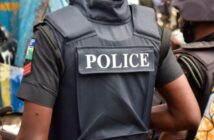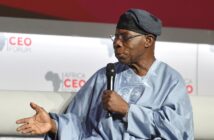A Federal High Court, Abuja, has fixed April 18 for hearing a N1 billion suit filed by Nnamdi Kanu, leader of the proscribed Indigenous People of Biafra (IPOB), against the federal government and Department of State Services (DSS).
Justice James Omotosho adjourned the matter after Kanu’s counsel, Alloy Ejimakor, indicated his interest to respond to a counter affidavit jointly filed by the DSS and its director-general (DG).
Upon resumed hearing yesterday, Gbenga Oladimeji, who appeared for the federal government, informed the court that they were yet to file their response on behalf of 1st and 2nd defendants because he was only being notified about the process though they had been served since March 6.
Oladimeji prayed for an adjournment to enable him respond appropriately.
But the DSS lawyer, Abdul Danlami, said they had filed their counter affidavit in opposition to Kanu’s plea.
Ejimakor then sought an adjournment to enable him to file a further affidavit in response to fresh issues raised by the DSS in their counter affidavit and Justice Omotosho adjourned the matter until April 18 for adoption of processes.
The News Agency of Nigeria (NAN) reports that Kanu, through his lawyer, Ejimakor, had filed the latest suit marked: FHC/ABJ/CS/1633/2023 for the enforcement of his fundamental rights while in detention.
In the originating motion dated and filed Dec. 4, the applicant sued the Federal Republic of Nigeria (FRN), Attorney-General of the Federation (AGF), DSS and its DG as 1st to 4th respondents respectively.
The suit was filed pursuant to Order II, Rules 1 & 2 of the Fundamental Rights Enforcement Procedure Rules 2009, among others.
In the motion, the detained IPOB leader prayed for eight reliefs.
He sought “a declaration that the respondents’ act of forcible seizure and photocopying of confidential legal documents pertaining to facilitating the preparation of his defence which were brought to him at the respondents’ detention facility by his lawyers, amounted to denial of his rights to be defended by legal practitioners of his own choice.”
He also sought a declaration that the respondents’ act of refusing or preventing his counsel from taking notes of details of counsel’s professional discussions/consultations with him at DSS detention amounted to denial of his right to be given adequate facilities for the preparation of his defence by legal practitioners of his own choice.
He also sought a declaration that the respondents’ act of eavesdropping on his confidential consultations/conversations with his lawyers on matters relating to preparation of his defence during the lawyers’ visitations amounted to denial of applicant’s right to be given adequate facilities for the preparation of his defence and to be defended by legal practitioners of his own choice.
He described the acts as illegal, unlawful, unconstitutional and constituted an infringement of his fundamental right to fair hearing as enshrined and guaranteed under Section 36(6)(b) & (c) of the 1999 Constitution (as amended) and Article 7(1)(c) of the African Charter on Human and Peoples Rights.
Kanu, therefore, sought an order of injunction restraining and prohibiting the respondents from their act of forcible seizure and photocopying of confidential legal documents brought to him at the detention facility by his lawyers.
But in a counter affidavit dated and filed by the DSS on March 12, the security outfit denied allegations levelled against it.
In the application deposed to by Yamuje Benye, a Legal Department staff, he said 11 paragraphs in Kanu’s affidavit were untrue.
He averred that Kanu was in safe and secured custody of the DSS and he Is not detained in solitary confinement.




